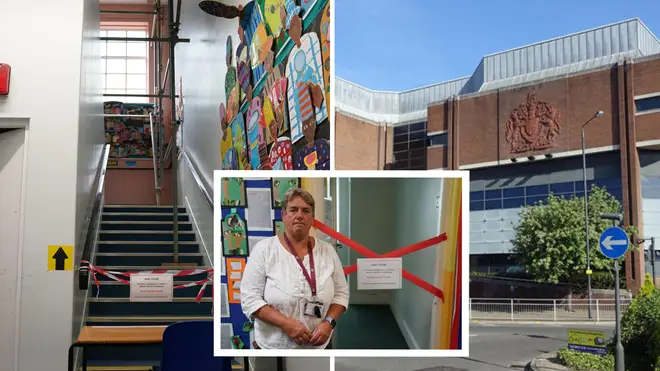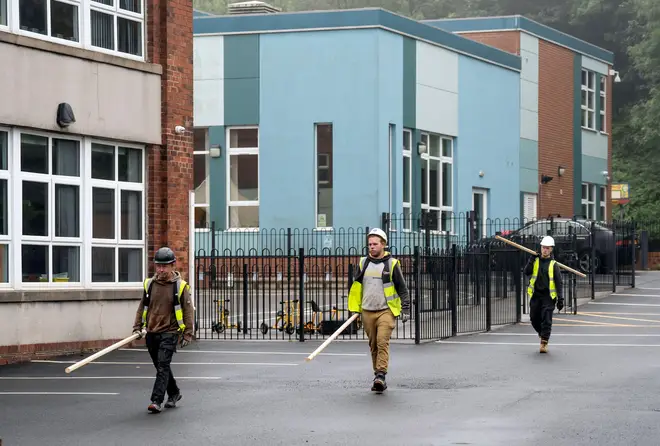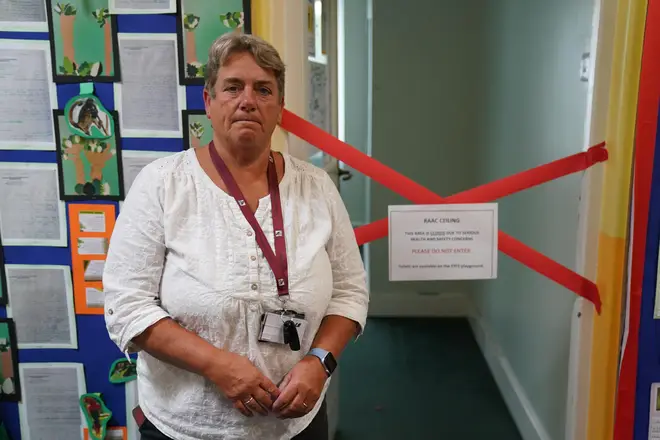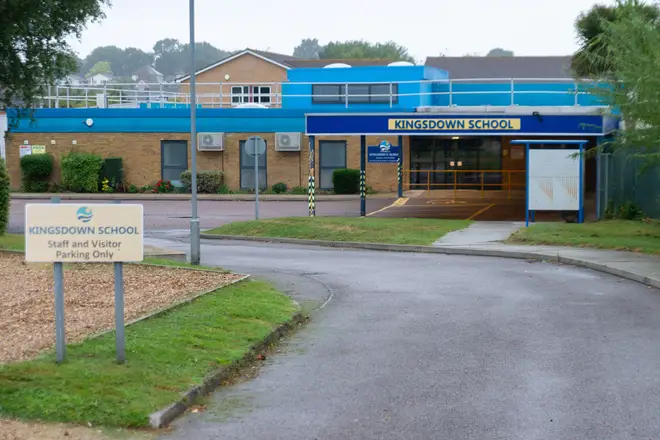
Shelagh Fogarty 1pm - 4pm
1 September 2023, 23:34 | Updated: 7 September 2023, 11:40

Hospitals and courts may contain the same crumbling concrete that has forced schools to close, and could be at risk of a similar collapse, an expert has warned.
A total of 104 schools have been told to shut buildings containing reinforced autoclaved aerated concrete (RAAC) amid fears it could collapse. Action has been taken on another 52.
It was a common building material in the second half of the 20th century but it is feared to be prone to coming down, having been compared to the inside of an Aero bar.
Some schools will need to relocate to new accommodation while safety measures are taken, with some having their ceilings propped up.
The same material could be found in any high-rise, flat-roofed building built from the late 1960s to the early 1990s, said Matt Byatt, the head of the Institute of Structural Engineers.
Some 41 hospitals were identified by the National Audit Office in July as containing RAAC. Harrow Crown Court was forced to close last week and will remain shut for nine months amid refurbishment works after RAAC was discovered.
Several other Ministry of Justice and Ministry of Defence buildings have also suffered structural issues with RAAC.
It comes as schools across the country were forced to close off sections of buildings days before the new term starts after finding RAAC. Thousands of children and staff are affected.
The decision was made abruptly after ministers learned that several school buildings had given way. The government has not released a list of schools affected and said it had no plans to do so due to "operational" reasons.
Gillian Keegan, the education secretary, said: "If you don't hear, don't worry."
The schools known to contain RAAC include Parks Primary, Mayflower Primary School and Willowbrook Mead Primary Academy in Leicester; Cranbourne College in Basingstoke; Crossflatts Primary School and Eldwick Primary School in Bingley, near Bradford; Abbey Lane Primary School in Sheffield; Scalby School in Scarborough; St Leonard's Catholic School in Durham; Winter Gardens Academy in Essex; and Corpus Christi Catholic School in Brixton, London.
Schools minister Nick Gibb sparked fury from Labour by claiming on LBC on Friday that he would let his nieces and nephews sit under classroom ceilings containing weak concrete if they were propped up.
Asked on LBC's Nick Ferrari at Breakfast if he would be happy to see his young nieces and nephews to sit in a classroom under a ceiling propped up by a steel girder, Gibb said: "Yes, because we're taking a very precautionary approach.
"Some say we're being overcautious in dealing with this. But the advice is you can prop up these beams. Where they are in a more dangerous condition, of course, we take that room out of use altogether.
"And that's the work that's happening with a case worker, with support from the Department, those 156 schools, and we continue to work to identify RAAC throughout the school system.

Schools Minister would be happy with relatives in classrooms with ceilings held up by 'props'
"There's no country in the world where you can be as assured as in this country that you have a government that is on top of this issue and is doing everything to identify where RAAC is and take action when we think it is unsafe for pupils."
But Labour hit back after his comments, with Bridget Phillipson, the shadow education secretary, saying: "Children sat underneath steel girders to protect them from the ceiling falling in: the defining image of thirteen years of a Conservative-run education system.
"You can't give children a first class education in second rate buildings. The next Labour government will ensure schools are fit for purpose and children are safe."

Gibb has also revealed the government realised the risk when a beam collapsed.
"What we discovered over the summer was a number of instances, in schools and in non-schools, in England and outside England, where RAAC that had been considered to be a low risk actually turned out to be unsafe," he told the BBC.
"So over the summer - given this evidence - we had to take a decision. And some of that evidence, by the way, was as late as last week. We had to then decide what to do given the previous advice.
“A beam that had no sign... that it was a critical risk and was thought to be safe collapsed."

Pupils having been told already that they will have to learn remotely at temporary classrooms or at different schools.
The DfE will fund essential works and temporary buildings but it will not cover the costs for emergency accommodation.
A questionnaire was sent out to schools in 2022 asking them to reply with whether they believed any of their buildings contained RAAC.

Those that said they did were investigated and action is now being taken where RAAC was found.
But MailOnline reports the list of responses to the questionnaire is "building all the time" after Thursday's closures announcement.
There are more than 20,000 schools in England.
The disruption to learning comes just after pupils in England received their GCSE and A-level results under a marking scheme closer to the pre-Covid one, despite having had their own education disrupted by the pandemic.
Dame Rachel De Souza, the Children's Commissioner, said: "After years of disruption for children and young people, what they need most is stability and getting back to normal.
"We must learn lessons from the pandemic, and we need to see proper communication to children and families affected by this guidance.
"There also needs to be clear direction as to where children should go at the start of the new term and reassure them that places are safe and suitable.
"An assessment must be made of other settings where children are, and guidance provided as soon as possible."
The Local Government Association, which represents councils - which oversee some schools - said it had warned about RAAC since 2018.
"Leaving this announcement until near the end of the summer holidays, rather than at the beginning, has left schools and councils with very little time to make urgent rearrangements and minimise disruption to classroom learning," said Cllr Kevin Bentley, the senior vice-chairman of the body.
